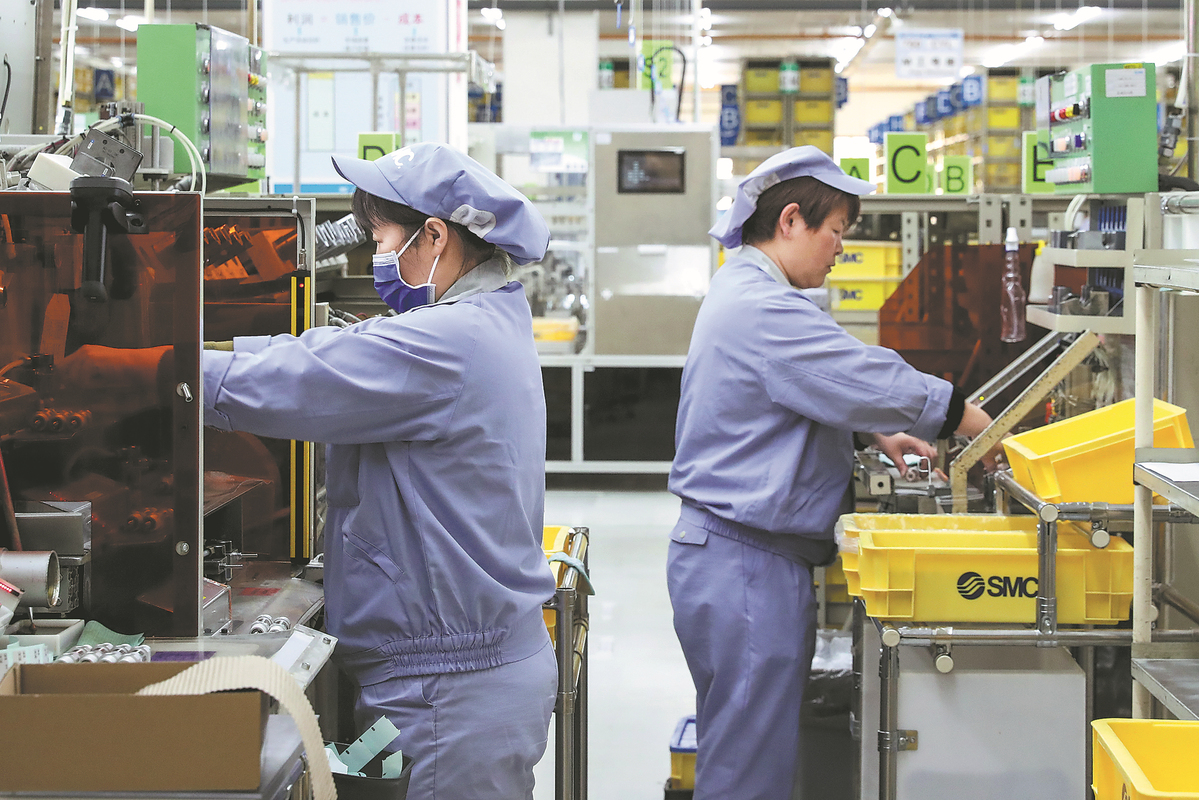
 0 Comment(s)
0 Comment(s) Print
Print E-mail China Daily, December 24, 2024
E-mail China Daily, December 24, 2024

Employees work on the production line of a foreign-funded enterprise in Beijing. [Photo/Xinhua]
Driven by improvements in sectors such as high-tech manufacturing, green energy and digital industries, the flow of foreign direct investment (FDI) is expected to continue recovering in China in 2025, market watchers and foreign business executives said on Monday.
From January to November, the actual use of FDI stood at 749.7 billion yuan ($103 billion), down 27.9 percent year-on-year. This fall narrowed by 1.9 percentage points compared to the January-October period, marking the third consecutive month of narrowing declines, latest data from the Ministry of Commerce showed.
Despite challenges such as rising geopolitical tensions and disruption of global supply chains in international business, many multinational corporations' "wait-and-see" attitude toward cross-border investment as well as a slow economic recovery in many parts of the world, China saw its actual utilized FDI grow by 6 percent year-on-year in November.
As many foreign companies, particularly labor-intensive ones, that were once competitive have become unsuitable for China's domestic economic development needs over time, a growing number of global firms have adjusted their investment strategies in the country, said Gao Lingyun, a researcher at the Institute of World Economics and Politics, which is affiliated with the Chinese Academy of Social Sciences in Beijing.
They are capitalizing on the country's strengths in opening-up policies, advanced supply chains, including its robust logistics infrastructure, large-scale production capabilities and competitive pricing strategies, Gao said.
"This trend is particularly evident in sectors like research and development, trade in services, new materials, chemicals and tech-intensive green products manufacturing," said Luo Yuze, deputy head of the department of foreign economic relations, which is part of the Development Research Center of the State Council.
For efficiency-driven multinational companies, regions with the most concentrated networks are becoming key priorities for strategic expansion. This focus is closely linked to factors such as industry connectivity, complementarity and accessibility, said Luo.
Agreeing with this view, Jeff Losch, vice-president and business manager for coating additives business at Milliken & Company, a United States-based specialty chemical and performance materials company, said China is a key market for Milliken, not only because of its vast scale but also due to its forward-thinking approach to sustainability.
"We have observed a strong demand in the electric vehicle (EV) and industrial coating businesses. China's EV industry is extremely strong and has led the global market this year, with Chinese EV manufacturers making their presence felt in markets across many countries," said Losch.
He said that the quick growth of China's EV market has clearly created significant opportunities for the coatings industry. EV manufacturing requires coatings with high durability and environmental standards, which align closely with Milliken's innovation goals.
Eager to seize more market share, the US company plans to continue investing in its innovation unit, expand sales networks and enhance supply chain operations within China.
In the first 11 months, investments from certain developed economies have continued to grow, with actual investment from Germany rising 10.9 percent year-on-year, up 4.8 percent from Singapore and 4 percent higher from Switzerland, according to the Ministry of Commerce.
Upbeat about the Chinese market, Swiss instrument manufacturer Endress + Hauser Group is currently expanding two of its plants in Suzhou, Jiangsu province.
Matthias Altendorf, the company's president of the supervisory board, said these expansion measures, along with a planned investment of 2 billion yuan over the next three to five years, are a key part of the group's long-term strategy in China.
"The growing maturity of China's high-tech industry has created significant market opportunities for us," said Altendorf.
Emerging sectors such as semiconductors and EV manufacturing are flourishing, driving a continuous rise in demand for high-precision measurement technologies. This growing demand has become a key impetus for foreign businesses to further increase their investments, he added.